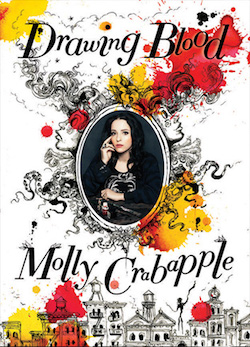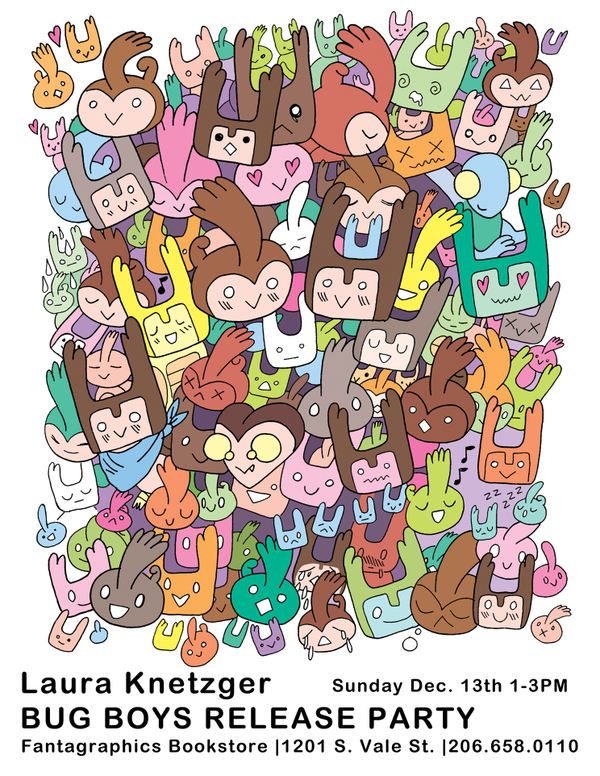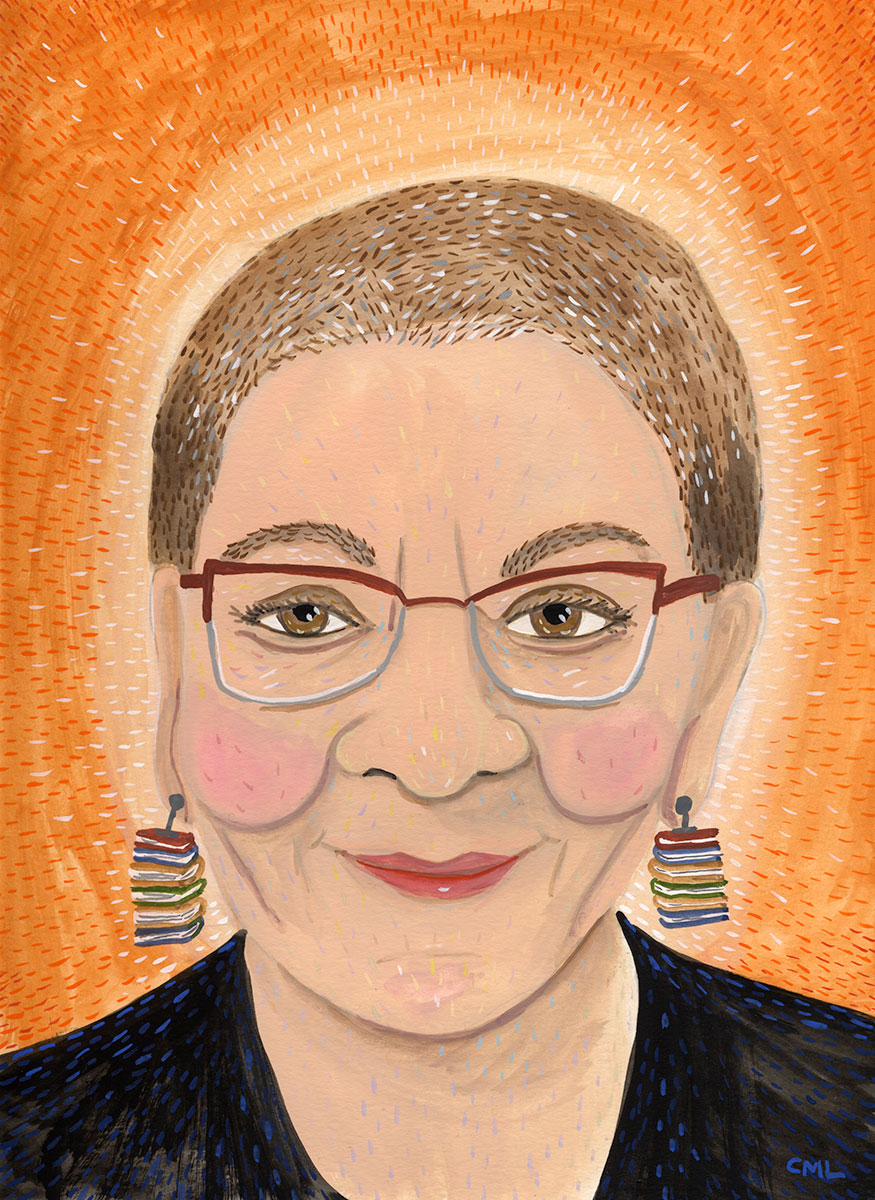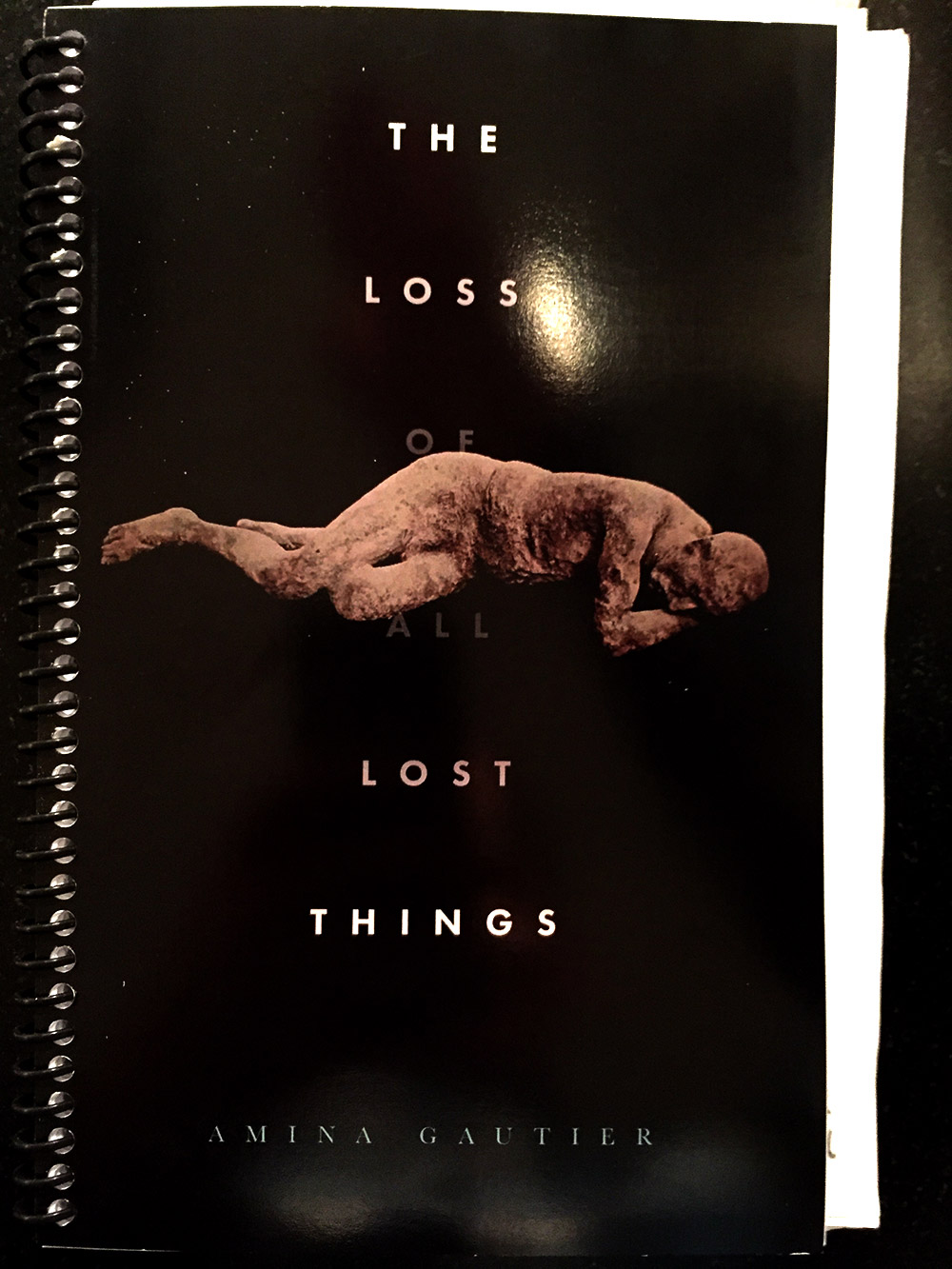The bad news is that the film adaptation of local author Jonathan Evison's spectacular novel The Revised Fundamentals of Caregiving has been changed. It's now The Fundamentals of Caring, a title that sacrifices specificity at the altar of sentiment.
But! Here's the good news: it stars Paul Rudd, so I will still be there for this movie whenever it opens locally. And here's the even-better news: it was announced last week that The Fundamentals of Caring will be the Closing Film at this coming year's Sundance film festival, a position of pride that indicates confidence in the quality of the film. Might we get to see it at next year's SIFF? Here's hoping.
Your Week in Readings: The Best Literary Events from December 14th - 20th

TUESDAY Hugo House hosts the Copper Canyon Press holiday party. A bunch of Copper Canon poets including Dean Young and Deborah Landau will read new work, and Copper Canyon staffers will introduce you to poets and books that could change your life. (This is the publisher that Sherman Alexie once called the best poetry press in America, after all.) They’ll offer great gift suggestions, too!
WEDNESDAY The best-looking literary event of the night is at the South Park Neighborhood Center, where Seattle Public Library staffers will lead a book club discussion of the excellent comic book memoir Marbles by Ellen Forney, who is a Seattle-area treasure.
THURSDAY University Book Store presents a Theo Chocolate and Coffee Tasting. There’ll be chocolate from Theo and coffee from Stumptown, along with signed copies of the Theo Chocolate cookbook. University Book Store does offer gift-wrapping, so this is a pretty easy way to score a good Christmas present and sneak some chocolate for yourself along the way.
FRIDAY At the Jack Straw Cultural Center Jack Straw musicians Sharon Nyree Williams and Stephen Cohen will present new work. (Williams is also a storyteller and poet.) They’ll be joined by Anna Balint, who will present writers from the Recovery Café Safe Place Writing Circle. Balint is recording writers from the Recovery Café in a series of podcasts.
SATURDAY It’s back to University Book Store for a special story time for kids, featuring treats, activities, and a visit from Santa Claus. (We have it on good authority that Mr. Claus will also pose for free photos with the kids, too.)
SUNDAY We’re about to enter the two most reading-free weeks of the year, but this is a great way to close out 2015: Seattle poet Sarah Galvin presents a debut party for her new book The Best Party of Our Lives at Hugo House. This is a heartwarming collection of true stories about gay weddings. Galvin will be joined by couples from the book, and she’ll be interviewed onstage by Official Awesome Person David Schmader. This one is not to be missed.
The Sunday Post for December 13, 2015
Janet Wolfe, Gothamite on a First-Name Basis With Her Era, Dies at 101
This is the finest obituary I have ever read. Janet Wolfe was quite obviously a brilliant force of nature. But more than this, Margalit Fox practically re-animates her with luxuriant and vivid prose. What a joy to read. And you have my respect, Ms. Fox, since you can talk a copy-desk editor into letting you launch your piece with this graf:
So. About Janet.
The Washington Post Style Guide Now Accepts Singular ‘They’
Especially in light of modern gender awareness, those opposing the singular they seem antiquated. Why, even the Washington Post has switched over.
In everyday speech, singular they, the use of they/them to refer to one person, feels completely natural. But in more formal contexts, and in writing, that usage has long been frowned upon. And not just frowned upon, but banned as ungrammatical. However, it is not ungrammatical in the same way as “I didn’t knowed that” or “what are you cook for dinner tonight?” Those sentences don’t sound natural in any context.
Proponents of singular they have long argued that the prohibition makes no sense. Not only is it natural, it has been used in English for centuries. It’s in the King James Bible. Authors like Chaucer, Shakespeare, Swift, Austen, Thackeray, and Shaw used it. Before the production of school textbooks for grammar in the 19th century, no one complained about it or even noticed it. Avoiding it is awkward or necessitates sexist language.
Poker, Wikipedia, and the Singular They
Speaking of the singular they, Andy Baio went looking for information on poker champion Annie Duke, and found a Wikipedia page on Texas Hold 'Em rife with gendered language.
Because it was Wikipedia, I felt like I could do something about it. So I spent some time making the biggest edit I've ever made on Wikipedia: changing every male pronoun to gender-neutral language, sometimes rephrasing as "the player," but often using the singular they. I tried to be careful about readability, making sure to only use it in cases where it couldn't be confused with a plural group.
Hacking the City
When Marcus Westbury moved back to Newcastle, Australia to open a bar, he was amazed that none of the downtown properties that were sitting vacant would rent to him. Instead, he came up with an ingenious plan that renovated the area.
He began contacting landlords and leasing agents, expecting to be overwhelmed with offers, but no one returned his calls. Some buildings had been purchased on the cheap by speculators, who expected to cash in when government redevelopment funds finally arrived and who were happy to leave them vacant while they waited. Others were owned by family trusts that couldn’t agree on anything except doing nothing. More than one landlord demanded rents the market couldn’t possibly bear. Westbury learned that lowering the asking price often meant writing down the value of the building, which risked triggering foreclosure. Landlords were incentivized to stand pat, while downtown fell into ruin. “No one was even trying,” Westbury said.
Read a chapter from Gregg Olsen through tomorrow
We have a chapter from Now That She's Gone, by sponsor Gregg Olsen, for one more day. Be sure to take a look — you might just get hooked.
That's why instead of blurbs and jacket copy alone, we offer you a full chapter to read from our sponsors. Just like in a bookstore when you pick up an unknown writer and take a look to see if you like them. We think this is a great way to get exposed to a huge variety of writing, and we're so pleased that Gregg Olsen joined us this week to show you. Take a look, and see if you're not curious about what's gonna happen in chapter 2.
In fact, it's with sponsors like him that we're working our darndest to make internet advertising 100 percent less terrible. Thanks to Gregg, we're able to bring you all of the content you read here every week. Help us thank him by giving that chapter a chance.
Rahawa Haile’s short stories of the day, of the previous week, for December 12, 2015
Every day, friend of the SRoB Rahawa Haile tweets a short story. She gave us permission to collect them every week. She's archiving the entire project on Storify.
Rahawa also wrote this week in the Millions about her year in reading.
Short Story of the Day #334
Kat Howard's "Those Are Pearls"
Guillotine (2015)
https://t.co/boLRrMdQTf pic.twitter.com/PBoToQ6pdS
— Rahawa Haile (@RahawaHaile) December 6, 2015Short Story of the Day #335
Jessica Gross's "Call Me Eliza"
Litro (2015)
https://t.co/rpjIsHeNb1 pic.twitter.com/3Q2ulAxRs3
— Rahawa Haile (@RahawaHaile) December 6, 2015Short Sorry of the Day: It's been hard to keep up with this project as the year winds down and hiking prep increases. Thank you for reading.
— Rahawa Haile (@RahawaHaile) December 6, 2015Short Story of the Day #336
Sofia Samatar's "Meet Me in Iram"
Guillotine (2015)
https://t.co/boLRrMdQTf pic.twitter.com/Mplweh7RVl
— Rahawa Haile (@RahawaHaile) December 6, 2015Short Story of the Day #337-340
Please just buy Danticat's Krik? Krak! already. It's as relevant as ever. https://t.co/cdsGGBb21r
— Rahawa Haile (@RahawaHaile) December 10, 2015This is Short Story of the Day #341. It is also 500 subtweets.
— Rahawa Haile (@RahawaHaile) December 11, 2015Nancy Pearl at Town Hall is our official Sunday pick, but before you head there you should drop by Fantagraphics and say hey to Laura Knetzger, from 1-3pm. She's throwing a release party for Bug Boys.
Bug Boys is a compendium of the comic of the same name, and it is really marvelous. Head down for her official release party, pick up the book and give a local hard-working comic artist some love and sales.


I've said many times that I'm not fond of year-end best-of book lists. Year-end lists, so far as I'm concerned, are like junk food: they're enjoyable, but they're probably not worth the time you put into reading (or writing) them. If you're looking for what the Seattle Review of Books believes to be the books of the year, I'd encourage you to look back through our Reviews section. Our co-founder Martin McClellan ingeniously constructed the Reviews pages to be something like browsing a bookstore. You can flip through the pages and browse the covers and see if something looks appealing to you.
But sometimes I have to acknowledge a particularly great year-in-review feature, and that is the case with NPR's Book Concierge. I love it because it's not constructed around the artificial list structure that so many other reviews are. In fact, it's less a review and more a recommendation engine: choose from a selection of filter tabs on the side to help you find a book to suit any interest. Rather than focusing on what some critic believes to be the best book of the year, it's focused on what books you might find interesting. That distinction, to me, makes all the difference. If you haven't, go check it out.
The Help Desk: No, but I watched the movie
Every Friday, Cienna Madrid offers solutions to life’s most vexing literary problems. Do you need a book recommendation to send your worst cousin on her birthday? Is it okay to read erotica on public transit? Cienna can help. Send your questions to advice@seattlereviewofbooks.com.
Dear Cienna,
Has there ever been a movie adaptation that's better than the book it's supposed to be based on?
Douglas, West Seattle
Dear Douglas,
That's like comparing apples to Amtrak. While they've got plenty of flash and money, movies can never hope to encapsulate the depth and imagination of books, let alone best them. The two mediums are as vastly different as a fortune cookie is from my favorite psychic-slash-preschool-teacher, Raven Moonwhisper. Sure, the cookie is momentarily satiating and its simple platitudes vaguely pleasing, but is a cookie ever going to charge me $50/hr to tell me which of my spirit guides is too drunk to trust and whether I should quit my job to pursue a career in animal husbandry? (Through trial and error I have discovered farm animals find my presence unnaturally arousing.)
At best, a good movie can enhance a great book experience in much the same way that playing Pink Floyd's Dark Side of the Moon enhances silent screenings of The Wizard of Oz and Schindler’s List.
But to answer your question: Ben Hur is definitely more entertaining than the Bible.
Kisses,
Cienna
Seattle did not receive City of Literature designation this year
UNESCO just released their full list of new members of the Creative Cities Network. Seattle, which was making its second bid to become a City of Literature, is not on that list. UNESCO does not make its deliberations public, but it's not hard to come up with reasons why we might not have made the list this year.
The sad thing is, after the unpleasantness of the spring passed, our City of Literature organization found a terrific, capable leader in Bob Redmond. Redmond is a tireless advocate for the arts in this city, and it was great to have him repping for our (truly world-class) literary scene. The reason a Creative Cities designation would be so great for Seattle is that it would direct the city to create an office devoted specifically to Seattle's literary scene, both to promote the resources we have and to cultivate those resources in partnership with other cities in UNESCO's Creative Cities Network.
The current City of Lit organization is getting together to discuss the future of the bid early next year. I believe that with Redmond's leadership and a board that doesn't have to suffer through continual unnecessary distractions and drama, we could earn that bid in 2016. But for now, let's congratulate this year's new Cities of Literature:
- Baghdad (Iraq)
- Barcelona (Spain)
- Ljubljana (Slovenia)
- Lviv (Ukraine)
- Montevideo (Uruguay)
- Nottingham (UK)
- Óbidos (Portugal)
- Tartu (Estonia)
- Ulyanovsk (Russian Federation)
To these new members: We in Seattle salute you, and we hope to join you soon.
Toward the end of Bethany Jean Clement's Seattle Times scoop about the sudden and mysterious closure of the Bauhaus coffee mini-chain, there's this additional terrible news:
And Twice Sold Tales in Ballard posted on Facebook: “Bauhaus Ballard, which my bookstore subleases from, is closing. I was just told, and told that their last day is Sunday. As yet, I have no idea how long I’ve got to move out or where I’m going to go.”
Here's hoping Twice Sold Tales can find some sort of an agreement to stay in the space. If you haven't been yet, it's a wonderful little bookshop, cramped in all the right ways and packed full of some wonderful weird stuff. Stop by and show your support if you're in the neighborhood.
We just got an invitation from Thomas Walton, the founder of PageBoy Magazine, which is one of the best print lit mags in the city. He's launching a new series of pop-up parties called, appropriately enough, "Art Party." Because it's too late to get it into Your Week in Readings, I thought I'd share it with you here:
Please join PageBoy Magazine for the inaugural episode of Art Party.
What it is: an art party with visual art and video by Sara Long. Prose by Stacey Levine. Poetry by Paul Nelson. Comedy by Ryan Casey and Doug Gale. Plus: the world’s first ever Hanging Bookshop!
What we want to do: counteract the disappearance of art spaces, bookshops, galleries, etc. throughout the city, and their systematic replacement with sterile architecture, sterile businesses, and profiteering development.
How we’re going to do it: by holding art parties in temporary open spaces within apartment buildings, commercial buildings, donated spaces, etc.
Why we want to do it: art makes for healthy cities, and healthy citizens; aesthetics matter!
Where: this first event to be held at 729 10th Ave E #1 (Capitol Hill)
When: Sunday 12/13 at 7 p.m.
I have no idea what the "Hanging Bookshop" bit means, but you bet I'm curious. Paul Nelson is a great reader of his own work. And if you haven't seen her read, Stacey Levine is an absolute trip. She's perfectly warm and friendly in person, but when she's onstage she's a spectral voice from another, much cooler dimension than ours. This should be an interesting evening out. And really, what better plans do you have for a Sunday night in December? None. You have none better plans.
Portrait Gallery: Nancy Pearl
Each week, Christine Larsen creates a portrait of a new author for us. Have any favorites you’d love to see immortalized? Let us know

Seattle's own best-known librarian appears Sunday, at Town Hall. Find out more about her on her website, hear her every week on KUOW, or watch her interview book people on the Seattle Channel (including our very own Paul Constant, back when he was somebody else's Paul Constant).
Thursday Comics Hangover: Utopian symmetry
In the back pages of the first issue of the new series Symmetry, writer Matt Hawkins admits he’s “gotten a bit sick of” dystopia’s omnipresence, and so he decided to try writing utopian fiction, instead. He read Sir Thomas More’s Utopia (“it’s boring as hell,” Hawkins tells his readers, urging them to “skim it”) and embarked on months of research, determining the four qualities of all utopias in fiction (ambition, creativity, diversity, and instruments of capital must be eliminated) and what he believes to be the four pillars of society (community, peace, harmony, and equality are required). Finally, Symmetry is his story of that utopia.
Hawkins was lucky enough to find an artist in Raffaele Ienco who seems uniquely qualified to draw a utopian vision: his art has a painterly quality that brings both beauty and detail to the surroundings. Each panel of Ienco’s is packed with information: we see gleaming hallways and countless background extras as our protagonist walks around his utopia, while dome-headed robot nannies supervise all the action and ensure that humans don’t cause each other (or themselves) any harm. (One robot snatches a beverage out of the hands of our main character, Michael, saying: “Citizen, excuse me! That drink is not optimized for your nutritional needs. This one is. Labeling error. My apologies, citizen.”) Occasionally, up close, the features of the people in Ienco’s art look too plasticine, but there’s so much information packed into every page that it’s an easy-enough flaw to ignore.
The first issue is entirely devoted to establishing the world. High-level technology renders it almost unrecognizable to us — humans are born asexual, for example, and they choose their own genders and names at age 13. And the reader has to spend most of the issue shaking off those dystopian reading habits. By issue’s end, you keep expecting Michael to turn the corner and find evil robots shoving humans into a giant pie-making device, or making a secret stash of feral humans fight for the robot’s amusement. But that kind of thing doesn’t happen in utopian fiction; the inciting incident for the action pretty much always has to come from outside.
You can’t dwell on the plot of the first issue of Symmetry, because, well, nothing much happens. That’s not really fair; aside from the establishment of a well-considered sci-fi world, two events happen, one of which is a spaceship crash. But it’s hard to say what the consequences of those actions are, exactly — what kind of a plot they’re propelling. It’s interesting to read a book and finish the first issue and know by the end of it that everything has changed, but to not know what that means, or even if we should be happy about it. I wouldn’t want to live in the world of Symmetry, but I sure am glad to visit.
For some time now, City Councilmember Nick Licata has sponsored a neat event at City Hall called the Words' Worth Poetry Series. Selected poets would read a poem to kick off City Council meetings. It was a small gesture, but an important one: it's always good to remind the City Council that the arts is what makes Seattle so wonderfully livable.
Today, Seattle poet Sierra Nelson says:
City Councilmember Nick Licata is leaving City Council at the end of this term, and to celebrate his innovative Words’ Worth Poetry Series and legacy of championing the arts in Seattle, current Words’ Worth curator, poet and performer Sierra Nelson, has invited past curators and readers to return to Seattle City Hall (600 4th Ave, City Council meeting room) on Wednesday, December 9th, 2015, 2:00-2:15 p.m., to read just the last lines of the poems originally read, creating a new “Last Lines” collaborative poem on the spot as a collective portrait of the city and its voices. As with all readings in the series, this event is free, open to the public, and will kick off an official City Council committee meeting; people may also watch it streamed live on The Seattle Channel.
Licata really has done a world of good for Seattle in the arts. He's supported artists in just about every way a city councilmember possibly could: by directing funds their way, by giving them the city's attention, by helping them find housing and creative space, by being in the audience. Some member of the new council had better step up to fill the hole that Licata is leaving; it will be an estimable challenge, but a very worthy one. We need an advocate for the arts at that level of government, and we're losing one of the very best advocates when Licata leaves office. I'm glad that the poets of Seattle are coming together to give him this weird, wonderful sendoff. If you can't make it to City Hall in half an hour, you should watch the poem as it's read online.
Un-perfumed letters
Published December 09, 2015, at 12:00pm
Books of letters can teach you so much about the correspondence, but what makes one fall flat while another one sings?
Holiday gift book recommendation #2: A House of My Own
Ask a thousand booksellers what you should buy as a gift for the holidays and you’ll get a thousand different answers. There’s no single perfect gift. But Letizia, a bookseller at University Book Store, is really excited about Sandra Cisneros’s book A House of My Own, and she thinks you should be, too.

Letizia’s voice bubbles over with enthusiasm for House. It’s “a collection of essays, articles, and non-fiction stories” that Cisneros has “compiled and collected over the past 30 years.” It’s autobiography, but also not: highlights for Letizia include a profile of Chavela Vargas, “an incredible ranchera singer” who was openly gay at a time when that was a dangerous decision, and a piece eulogizing Eduardo Galeano.
What attracts Letizia to Ciscneros’s work? “She’s very honest about her process and her feelings. For example, there’s an essay in here about her being the only daughter— how her dad always used to introduce his kids as saying he has seven sons and she’d say, ‘no you have six sons and a daughter.’” That discomfort, Letizia explains, and those “lack of expectations,” gave Cisneros “the freedom to write.”
But would someone who’s never read Cisneros enjoy A House of My Own? “Definitely, it would be rewarding,” Letizia says. In fact, she thinks new readers “would get sucked into it.” Cisneros’s voice is just so welcoming. “Everything that she puts down on paper seems so intimate. It’s like when someone you care about makes you dinner? That’s how I feel when I read her writing. She really does it to honor the reader,” Letizia says.
So what kind of people would this be a great gift for? Letizia says it would appeal to travelers —“she writes a lot of about Yugoslavia and France and Greece and how she interacts with people there” — and for aspiring writers, who’ll find Cisneros’s openness to be “very inspirational.”
The bookseller’s curse is that by the time the holidays come around and they get to really promote their holiday picks, they’ve already read a dozen other books in the interim. So what has Letizia been reading lately? “I don’t really read a lot of modern, newer stuff. I just read Lit by Mary Karr. It was absolutely incredible — a real kick in the pants to read.” And she just started reading the Wrinkle in Time quintet. Somehow, when she was a kid, she never found out Madeline L’Engle wrote more than one book in the series, but Letizia is fixing that mistake even as you read these lines: “I’m deep in that now,” she says.
As Paul previously mentioned, we're teaching a class at Hugo House about book reviewing. We've already met a few nice folks who have signed up, and we'd love it if you were there as well.
Registration for Hugo House members was open a week ago, but now anybody can sign up. We're going to have a lot of fun in this class — you'll walk away with a deep understanding of reviewing, and with a number of finished reviews on books you feel passionately about.
We're making no secret of the fact that we're hoping to find future reviewers for this site, and what better way than to teach you everything we know? Please join us.
Margaret Atwood's first comic is called Angel Catbird, it's an all-ages story about a hero who gets his genes spliced with a bird and a cat, it comes out fall 2016 from Dark Horse Comics, and it's illustrated by the talented Johnnie Christmas, who drew the Image series Sheltered. Sounds weird. I'm in.

